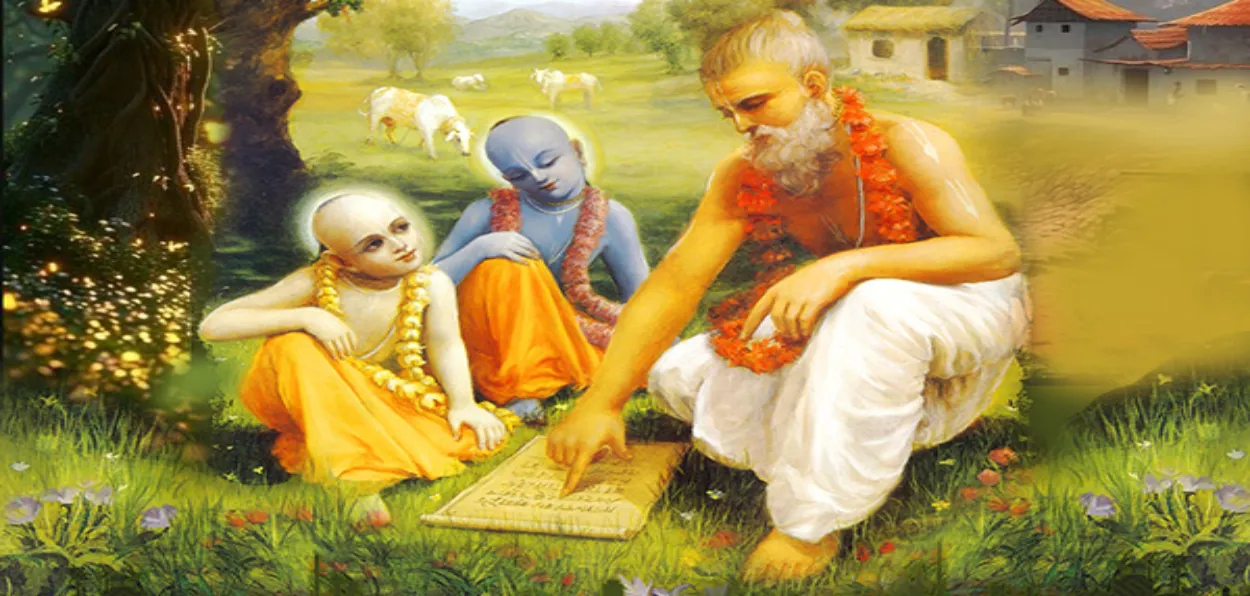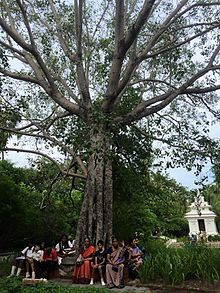
Suvir Saran
My mother and my paternal grandfather, Nana, blessed me with the teachings of the Vedanta, a philosophy that puts one front and center and teaches us to take charge of our life without getting lost in putting blame on others, on circumstances, or on destiny for what happens to us. They made me more curious, more hungry, more questioning, and more of a thorn in the side of those selling easier ways of living, learning, loving and accepting. I would listen with awe to the grand magnificence of their uttering, and they, in turn, would give gratitude to the Vedas and Upanishads, to the Bhagwad Gita and the tutelage they gained from learned women and men who espoused the wisdom of Vedanta.
Papa, on the other hand, was loathe to talk much about religion; he was a practicing Radha Soami of the Soami Bagh, Agra order. Every day he prayed for a few minutes and lit an incense stick as he did so, and even before I could appreciate the fact that he was in prayer, he had finished it. When I asked what this prayer did, he called it a discipline and a repeated chore that kept him focused and connected to the past traditions of the family and to the greater good that exists in all of us.
When we asked him what he thought of the elaborate ways in which his beloved family members worshipped, he told us that there are other ways of connecting to the divinity within. My sister would follow in the lead of my paternal aunt and be found chasing all paths toward greater spiritual development and mental peace, and Papa wouldn't argue at all, but gave her that indulgence and supported her in her journey. This taught us from a young age to not only accept other ways of believing and being, but also to respect and celebrate them for their differences.
Some of the books by Suvir Saran
Mom taught me to view good and bad, success and failure, as two sides of the same coin, and, more importantly, as the direct consequences of my own actions. Mum, who is logical and kind all at once, brought incredible erudition and empathetic authenticity to answer any excuse we kids gave to dodge responsibility. In doing so, she brought us back into our own hearts and conscience, where we found answers that suited us and were most in tandem with the flow of our being.
My mum, a proficient economist who was never allowed to be a working professional because of her choice to marry for love and raise me and my siblings, told us kids that life is all about cause and effect. She always asked us to be working hard with passion and joy, giving every situation our very best, and leaving what was left to a future that would be easier on us because we had given it fodder toward better outcomes.
I remember having to repeat Class 6th and deal with the shame that this brought upon me, and the shame I felt I had brought upon my parents and siblings. At my lowest, my mom gave me hope and comfort, knowing that I was aching and broken, bruised and embarrassed, hurt and betrayed, by myself and my teachers. She encouraged me to accept their decision and to think of it with a generosity of self, to be open to receiving greater education and opportunities.
This wasn't easy to do, and neither was it absorbed with any ease, but Mom's gentle demeanor, firm resolve and unflappable grace made me see light in the morass of darkness in which I was drowning. I could never understand why I was kept behind, and I don't have the answers even today. What I do know is that it made me stronger and certainly made me lose a lot of my innocence. I was hardened at a tender age and made rougher and gruffer than I might have become otherwise. The stoic strength and persistence people see behind my fashionably chic, effervescent and gay veneer is a direct result of that childhood failure.
That strength and resilience, not destiny, brought me to New York City in 1993. Destiny is a vehicle of our invention and has little to do with life's intentions or its course. It was my free will and the manifestations of my childhood dreams that landed me in the freest and most exciting city in the world. My mom had a green card because her parents were residents of America; they had gotten that residency because my maternal uncle, a doctor in the United States, became a citizen. I share this to demonstrate the very real, intentional steps that led to my arrival in Manhattan at age 20.
NYC of the 1990s wasn't the city it is today. The tech boom hadn't happened, and Indians were just coming of age. The ripples of the nastiness that came with the dot-busters were still fresh, and it wasn't cool to be Indian. What I gleaned from the Vedantic conversations at home, around our table, during conversations with Nana and Mom and which were furthered by my paternal aunt Deepa Bhatnagar, were the life lessons that helped me understand my inner being and my true personality and identity. I had to find my niche with care and make myself fit in. I understood from my parents' teachings that my successes as well as my failures in this adopted land would be entirely of my own making I had to go about becoming my own advocate in this foreign land and empower myself to shape, define and create my destiny.
 Bodhi Tree in Gaya, Bihar
Bodhi Tree in Gaya, Bihar
During those early years my mothers' words that our lives are our opportunity to give to others kept popping into my head, and I decided I would become a giver and not a taker. What Vedantic philosophy did for me was to take me from being a typical selfish human to striving to become as selfless as Mum, who lives and thrives in that realm. The more selfless I became, the greater happiness and success I felt in the everyday things that others find mundane. I realized both Mum and Papa wanted me to learn the art of doing things right. They wanted me to think mindfully, behave in a circumspect and magnanimous manner, to appreciate the differences I saw in others, and take responsibility for the course of my own life.
On this Guru Purnima, the day that marks Budha achieving enlightenment under the Bodhi tree, I bow to him with devotion and also to my elders, Papa, Mom, and Nana, the caregivers and staff at our home, my teachers and professors, my bosses and business partners, my mentees and students, my siblings and friends.
ALSO READ: Muslims ready to welcome Kanwariyas with open hearts: MRM
"I appreciate how each of them has given me lessons and learnings that have built the framework, the architecture and foundation of the roadmap that has been my journey of life. From them I have learned to live and breathe, grow and appreciate, march on and be all myself, and in doing so, be the master creator of my future and the designer of my own good or bad fortune.
Suvir Saran is an author, columnist and Michelin Star Chef. The views expressed in this column are his own.
